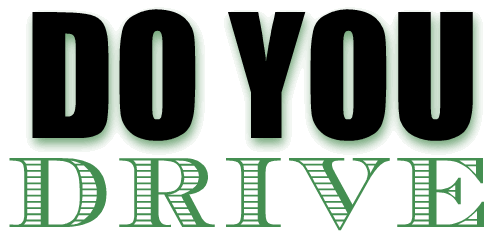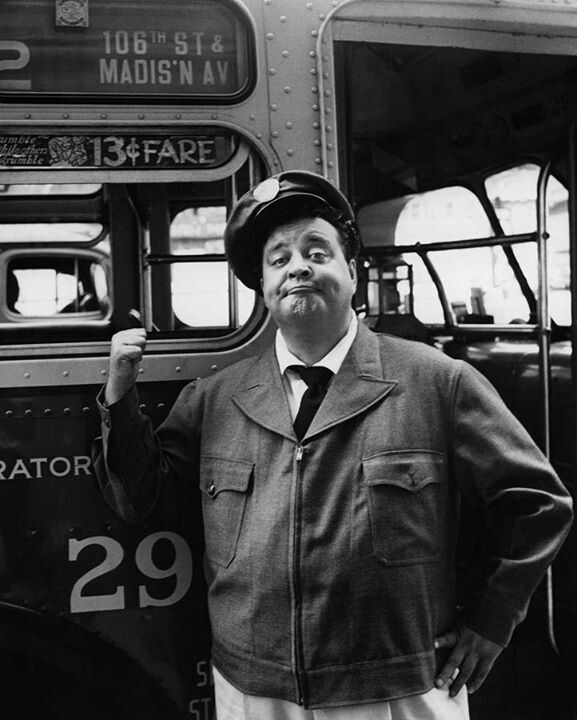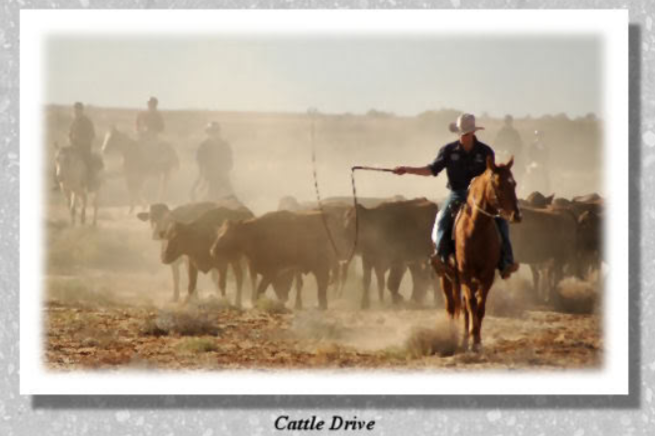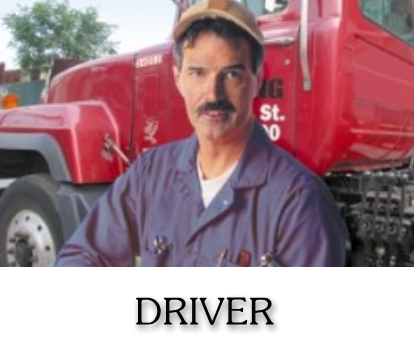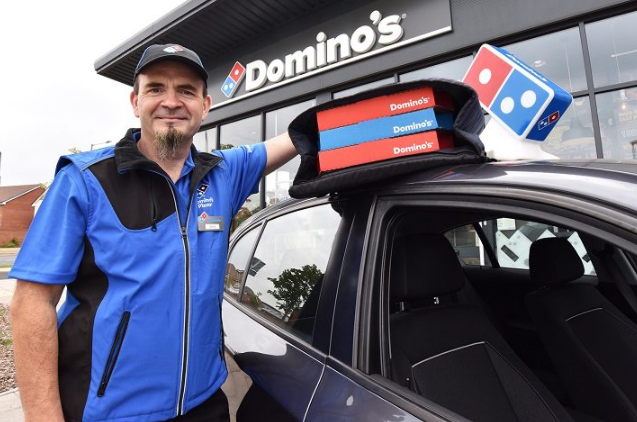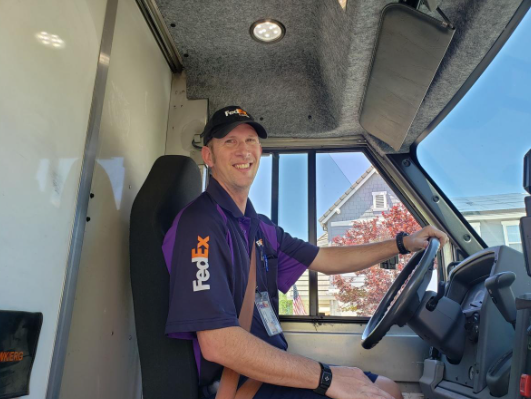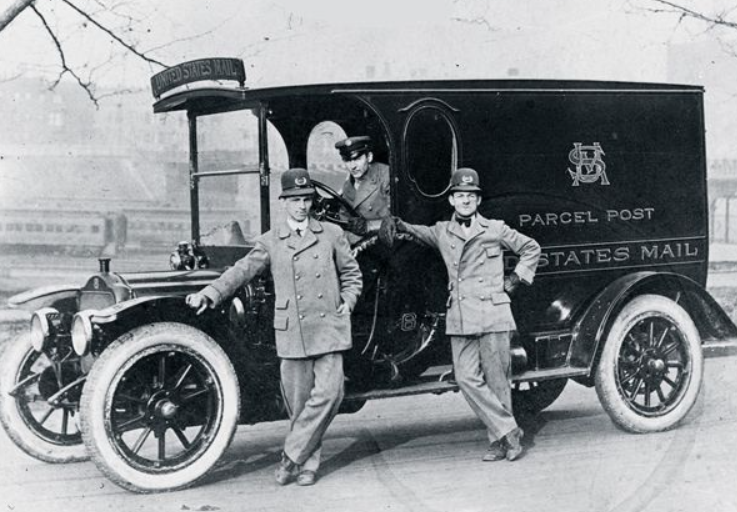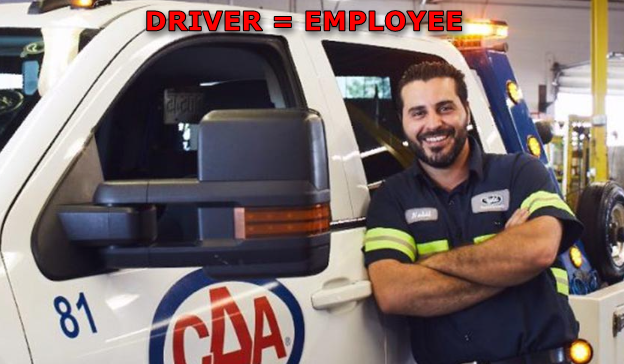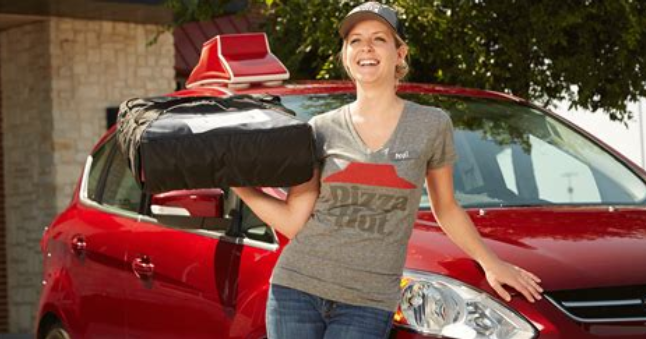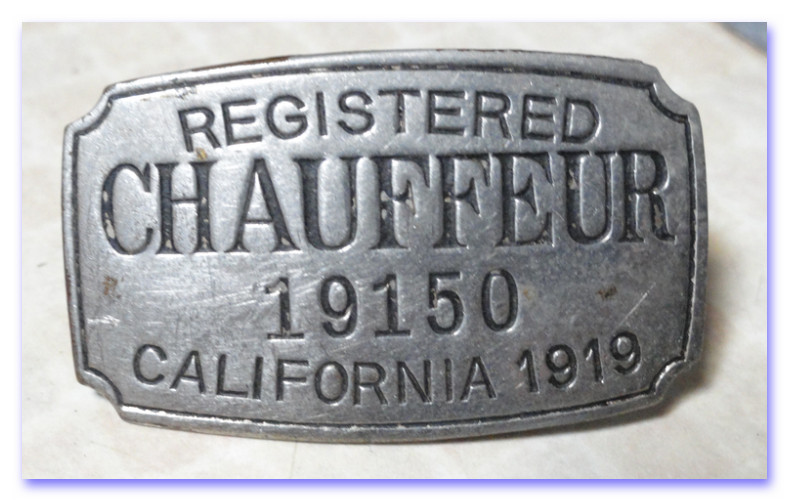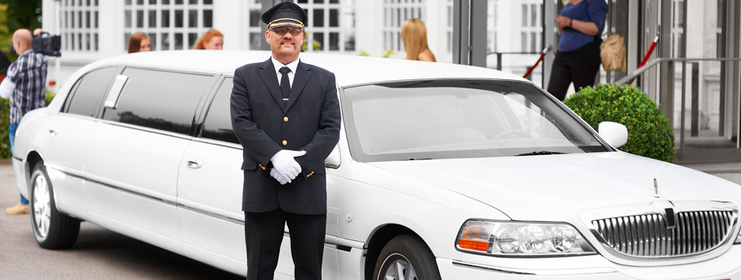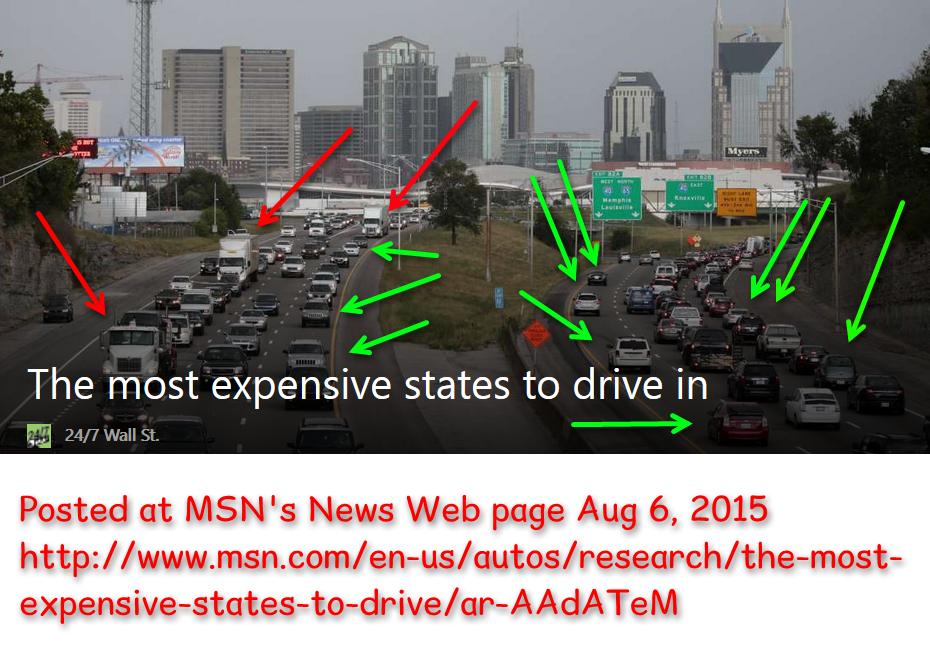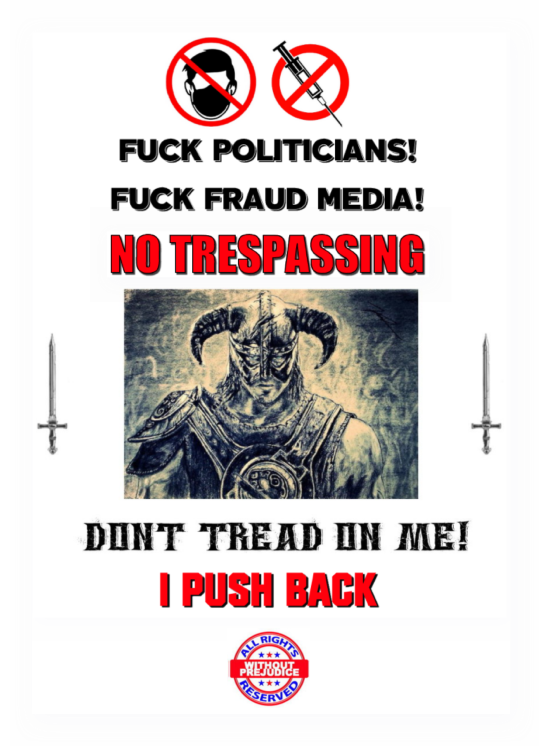CODE OF FEDERAL REGULATIONS
Title 49, Volume 4, Parts 200 to 399
Revised as of October 1, 1999
From the U.S. Government Printing Office via GPO Access
CITE: 49 CFR 390
[Page 859 - 865]
TITLE 49 -- TRANSPORTATION
CHAPTER III--FEDERAL HIGHWAY ADMINISTRATION, DEPARTMENT OF TRANSPORTATION
PART 390--FEDERAL MOTOR CARRIER SAFETY REGULATIONS; GENERAL--Table of Contents
Subpart A--General Applicability and Definitions
Sec. 390.1 Purpose.
This part establishes general
applicability, definitions, general requirements and information as
they pertain to persons subject to this chapter.
Sec. 390.3 General applicability.
(a) The rules in subchapter B of
this chapter are applicable to all employers, employees, and commercial
motor vehicles, which transport property or passengers in interstate
commerce.
Sec. 390.5 Definitions.
Driver means any person who operates any commercial motor vehicle.
Interstate commerce means trade, traffic, or transportation in the United States –
(1) Between a
place in a State and a place outside of such State (including a place
outside of the United States);
(2) Between
two places in a State through another State or a place outside of the
United States; or
(3) Between
two places in a State as part of trade, traffic, or transportation
originating or terminating outside the State or the United States.
Intrastate commerce means any trade, traffic, or transportation in any State which is not described in the term ``interstate commerce.''
Motor vehicle means any
vehicle, machine, tractor, trailer, or semitrailer propelled or drawn
by mechanical power and used upon the highways in the transportation of
passengers or property, or any combination thereof determined by the
Federal Highway Administration, but does not include any vehicle,
locomotive, or car operated exclusively on a rail or rails, or a
trolley bus operated by electric power derived from a fixed overhead
wire, furnishing local passenger transportation similar to
street-railway service.
Operator -- See driver.
DRIVER - One employed in conducting a coach, carriage, wagon, or other vehicle,...
Bouvier's Law Dictionary (1856)
Black's Law Dictionary, 2nd Ed., 1910
Black's Law Dictionary, 3rd Ed., 1933
Black's Law Dictionary 4th Ed., 1951
Dictionary of Occupational Titles, 1965, Volume 1, Definition of Titles (dom. ser.) see CHAUFFEUR.
1. LICENSES (§ 5*) - CHAUFFEURS.
The occupation of a chauffeur is one calling
for regulation and therefore permitting a regulatory license tax.
[Ed. Note. - For other cases, see licenses, Cent. Dig §§4, 19; dec. Dig. § 5*]
2. STATUTES (§ 81*) - SPECIAL LEGISLATION - CLASSIFICATION.
Dividing, as does St. 1913, p. 639, drivers of
automobiles into two classes, one professional chauffeurs, and
requiring them to obtain a license, and pay an annual fee of $2, the
other embracing all others, who are not required to secure a license or
pay a license fee, is sound classification and not arbitrary, so as to
constitute special legislation.
Ex parte Stork (1914) 167 Cal. 294, Cr. 1843, Supreme Court of California
CORPUS JURIS SECUNDUM
Vol. 53
LICENSES
by Thoman Muskus, J.D.
§1 License defined
A license is a right or
permission granted by some competent authority to carry on a business
or do an act which without such license, would be illegal.
The general term “license” means
a right or permission granted by some competent authority to carry on a
business or do an act which, without such license, would be
illegal. In other words it is a formal or official permit
or permission to carry on some business or do some act which without
the license, would be unlawful, and the words “license” and “permit”
are often used synonymously. It has also been defined as
the granting of a special privilege to one or more persons, not enjoyed
by citizens generally, or, at least, not by a class to which the
licensee belongs.
§2 Occupation and privilege defined
An occupation is any business,
trade, or profession, and a privilege is the exercise of an occupation
or business which requires a license from some proper authority.
The word “occupation” as used in
the connection with the licensing thereof and the imposition of taxes
thereon is identical in meaning with the word “privilege” and includes
any business, trade, profession, pursuit, vocation or
calling. A privilege is the exercise of an occupation or
business which requires a license from some proper authority,
designated by some general law, and is not free to all, or any without
such license. The possession of an occupational license is
a privilege.
The state has the authority to regulate the use of public highways for business purposes.
Morel v. Railroad Commission of California (1938), 11 Cal.2d 488
A license proper is a permit to do business which could not be done without the license.
CITY AND COUNTY OF SAN FRANCISCO v. LIVERPOOL AND LONDON AND GLOBE INSURANCE COMPANY et al. (1887) 74 Cal. 113
A license in its proper sense is a permit to do business which could not be done without the license.
CITY OF SONORA v. J. B. CURTIN (1902) 137 Cal. 583
In California, a license is defined as "A permit, granted
by an appropriate governmental body, generally for a consideration, to
a person or firm, or corporation to pursue some occupation or to carry
on some business subject to regulation under the police power."
Rosenblatt v. California (1945) 69 Cal. App. 2d 69
"The only limitations found restricting the right of the state to
condition the use of the public highways as a means of vehicular
transportation for compensation are (1) that the state must not exact
of those it permits to use the highways for hauling for gain that they
shall surrender any of their inherent U.S. constitutional Rights as a
condition precedent to obtaining permission for such use..."
Riley v Lawson, 143 So. 619
Stephenson v Binford, 287 US 251
87 ALR 721

SEE
WHAT THE LAW MAKERS DID? THEY COMBINED TWO COMMERCIAL
LICENSES INTO ONE. BOTH CHAUFFEUR AND DRIVER GET
PAID! WHEN YOU GO TO GET GROCERIES OR TO YOU PLACE OF
WORSHIP OR A DOCTOR'S APPOINTMENT OR TO TAKE THE KIDS TO SCHOOL AND
PICK THEM UP, DO YOU GET PAID? WHEN YOU GO TO THE MOVIES OR
TO GET AN ICE CREAM CONE DO YOU GET PAID? IS THAT YOUR
JOB? DO YOU EARN? A HOUSEHOLD ERRAND IS NOT A 9 to 5
JOB! GOING TO LOOK AT THE PRETTY DECORATIONS ON THE HOUSES AT
CHRISTMAS IS NOT A 9 to 5 JOB, IT'S PLEASURE AND ENJOYMENT!

TRAFFIC 1. Business
or trade, commerce. 2. Transportation. 3. The movement of vehicles on
street or highway, as, the traffic is very heavy today.
Webster's Unified Dictionary and Encyclopedia, International Illustrated Edition (1960)
Traffic - Business or trade, commerce, Transportation.
Bouvier's Law Dictionary (1856)
Black's Law Dictionary, 1st ed. (St. Paul, Minn.: West Publishing, 1891)
Black's Law Dictionary, 2nd ed. (St. Paul, Minn.: West Publishing, 1910)
Black's Law Dictionary, 3rd ed. (West Publishing Co., 1933)
Black's Law Dictionary, 4th ed. (St. Paul: West, 1951)
CALIFORNIA PENAL CODE
484d(9)
"Traffic" means to transfer or otherwise dispose of property to
another, or to obtain control of property with intent to transfer or
dispose of it to another.
“The activity licensed by state DMVs - the operation of motor vehicles - is itself integrally related to interstate commerce.”
Seth Waxman, Solicitor General
U.S. Department of Justice
BRIEF FOR THE PETITIONERS
Reno v. Condon, 528 U.S. 141, January 12, 2000
Supreme Court of the United States
[ READ OR COPY THE BRIEF HERE : https://www.justice.gov/osg/brief/reno-v-condon-merits
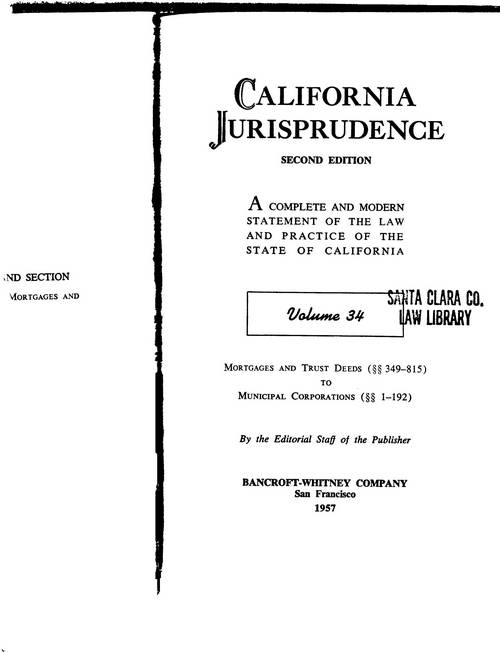
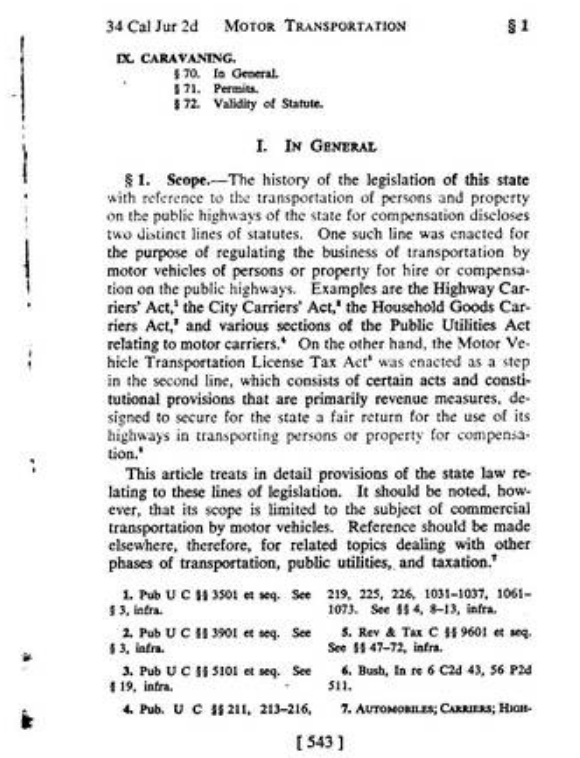
Transportation - The act or business of moving passengers and goods.
Webster's Unified Dictionary and Encyclopedia, International Illustrated Edition (1960)
Transportation - The removal of goods or persons from one place to another, by a carrier.
Black's Law Dictionary, 3rd Ed., 1933
Black's Law Dictionary, 4th Ed., 1951
Black's Law Dictionary, 6th Ed.
CALIFORNIA PUBLIC UTILITIES CODE
5108.
"Motor vehicle" means every motor truck, tractor, or other
self-propelled vehicle used for transportation of property over the
public highways, otherwise than upon fixed rails or tracks, and any
trailer, semitrailer, dolly, or other vehicle drawn thereby.
5110.5. With respect to a motor vehicle used in the transportation of property for compensation by a household goods carrier, "owner" means the corporation or person who is registered with the Department of Motor Vehicles as the owner of the vehicle, or who has a legal right to possession of the vehicle pursuant to a lease or rental agreement.
5140. It is unlawful for the owner of a household goods carrier motor vehicle employing or otherwise directing the driver of the vehicle to permit the operation of the vehicle upon any public highway for compensation
without first having obtained from the commission a permit pursuant to
this chapter or without first having complied with the vehicle
identification requirements of Section 5132 or with the accident
liability protection requirements of Section 5161.
5352. The use of the public highways for the transportation of passengers for compensation is a business
affected with a public interest. It is the purpose of this chapter to
preserve for the public full benefit and use of public highways
consistent with the needs of commerce without unnecessary congestion or
wear and tear upon the highways; to secure to the people adequate and
dependable transportation by carriers operating upon the highways; to
secure full and unrestricted flow of traffic by motor carriers over the
highways which will adequately meet reasonable public demands by
providing for the regulation of all transportation agencies with
respect to accident indemnity so that adequate and dependable service
by all necessary transportation agencies shall be maintained and the
full use of the highways preserved to the public; and to promote
carrier and public safety through its safety enforcement regulations.

TITLE 18, UNITED STATES CODE, SEC. 31
PART I - CRIMES
CHAPTER 2 - AIRCRAFT AND MOTOR VEHICLES
Sec. 31. Definitions
When used in this chapter the term -
''Motor vehicle'' means every description of carriage or other contrivance propelled or drawn by mechanical power and used for commercial purposes on the highways in the transportation of passengers, passengers and property, or property or cargo;...
''Used
for commercial purposes'' means the carriage of persons or property for
any fare, fee, rate, charge or other consideration, or directly or
indirectly in connection with any business, or other undertaking
intended for profit;
Blashfield, AUTOMOBILE LAW AND PRACTICE 3d Ed (1998):
Ch. 465 CLASSIFICATION OF MOTOR VEHICLES
"Section 465.4 Classification as Pleasure Cars or Commercial Vehicles
"A classification of motor
vehicles, based on whether they are used for business or commercial
purposes, or merely kept for pleasure or family use, a license being imposed in one case and not in the other,
is a proper one. [27. La.--Gulf States Utilities v. Traigle, 1975, 310
So.2d. 78. Ohio.--Fisher Bros. Co. v. Brown, 146 N.E. 100, 111 Ohio St.
602. Or.--Kellaher v. City of Portland, 110 P. 492, 112 P. 1076, 57 Or.
575. Tenn.--Ogilvie v. Hailey, 210 S.W. 645, 141 Tenn. 392. Vt.--State
v. Caplan, 135 A. 705, 100 Vt. 140.] "Thus a county
ordinance levying a tax for the privilege of using the county roads,
and fixing no license tax on an automobile used by the owner or his
family for other than commercial purposes is not unreasonable and
arbitrary in the imposition of the tax on vehicles used for commercial
purposes. [28 Ala.--Hill v. Moody, 93 So. 422, 207 Ala. 325.]"
1. LICENSES (§ 5*) - CHAUFFEURS.
The occupation of a chauffeur is one calling
for regulation and therefore permitting a regulatory license tax.
[Ed. Note. - For other cases, see licenses, Cent. Dig §§4, 19; dec. Dig. § 5*]
2. STATUTES (§ 81*) - SPECIAL LEGISLATION - CLASSIFICATION.
Dividing, as does St. 1913, p. 639, drivers of automobiles into two classes,
one professional chauffeurs, and requiring them to obtain a license,
and pay an annual fee of $2, the other embracing all others, who are not required to secure a license or pay a license fee, is sound classification and not arbitrary, so as to constitute special legislation.
Ex parte Stork (1914) 167 Cal. 294, Cr. 1843, Supreme Court of California
CALIFORNIA VEHICLE CODE
415. (a) A "motor vehicle" is a vehicle...
670. A "vehicle" is a device...
DEVICE. An invention or
contrivance; any result of design; as in the phrase "gambling device,"
which means a machine or contrivance of any kind for the playing of an
unlawful game of chance or hazard. State v. Blackstone, 115 Mo. 424, 22
S.W. 370.
Black’s Law Dictionary. 4th Ed. (1950), p. 538
device
: an object, machine, or piece of equipment that has been made for some special purpose
http://www.merriam-webster.com/dictionary/device
device - noun
1. a thing made for a particular purpose; an invention or contrivance, especially a mechanical or electrical one.
http://dictionary.reference.com/browse/device
device - noun
1 a machine or piece of equipment that does a particular thing
labour-saving device (=a machine that reduces the work you have to do):
http://www.macmillandictionary.com/dictionary/british/device
APPLIANCE. Refers to machinery and all instruments used in operating
it, and is to be distinguished from word "materials," which includes
everything of which anything is made. Things applied to or used as a
means to an end. Roberts v. City of Los Angeles, 61 P.2d 323, 330, 7
Cal.2d 477. An "appliance" is a mechanical thing, a device or
apparatus. One Black Mule v. State, 204 Ala. 440, 85 So. 749.
Black’s Law Dictionary, 4th Ed. (1950), p. 127
APPARATUS
apparatus noun
c: an instrument or appliance designed for a specific operation
https://www.merriam-webster.com/dictionary/apparatus#synonyms
apparatus
ap·pa·rat·us (ăp ə-răt əs, -rā təs)
n. pl. apparatus or ap·pa·rat·us·es
1.
a. An appliance or device for a particular purpose:
b. An integrated group of materials or devices used for a particular purpose:
[Latin apparātus, preparation, from past participle of apparāre, to
prepare : ad-, ad- + parāre, to prepare; see perə- in Indo-European
roots.]
American Heritage® Dictionary of the English Language, Fifth Edition.
Copyright © 2016 by Houghton Mifflin Harcourt Publishing Company.
Published by Houghton Mifflin Harcourt Publishing Company. All rights
reserved.
https://www.thefreedictionary.com/apparatus
ap•pa•rat•us (ˌęp əˈręt əs, -ˈreɪ təs)
n., pl. -tus, -tus•es.
1. a group or combination of instruments, machinery, tools, or materials having a particular function:
2. any complex instrument or mechanism for a particular purpose:
[1620–30; < Latin apparātus <apparāre to prepare]
Random House Kernerman Webster's College Dictionary, © 2010 K
Dictionaries Ltd. Copyright 2005, 1997, 1991 by Random House, Inc. All
rights reserved.
https://www.thefreedictionary.com/apparatus
APPARATUS.
An outfit of tools, utensils, or instruments adapted to accomplishment
of any branch of work or for performance of experiment or operation.
McClintock & Irvine Co. v. 'Etna Explosives Co., 260 Pa. 191, 103
A. 622, 623, Ann. Cas.1918E, 1078. A group or set of organs concerned
in performance of single function. First State Bank of Perkins v.
Pulliam, 112 Okl. 22, 239 P. 595, 596. A generic word of the most
comprehensive significance which may mean implements..., and
adapted as a means to some end. Bruce v. Sibeck, 25 Cal.App.2d 691, 78
P.2d 741, 743.
As used in statutes granting exemption from execution, etc., "apparatus"
means a complex device or machine designed for the accomplishment of a
special purpose; a complex instrument or appliance, mechanical or chemical, for a specific action or operation; machinery;
mechanism; as a newspaper printing press, Harris v. Townley, Tex.
Civ.App., 161 S.W. 5; or four pool tables, Harris v. Todd,
Tex.Civ.App., 158 S.W 1189; but not a threshing outfit, Corner v.
Powell, Tex.Civ.App., 189 S.W. 88, 91; nor a well-drilling rig,
consisting of boiler, engine, and other parts of complicated machinery, Thresher v. McEvoy, Tex.Civ. App., 193 S.W. 159, 160. In re Willis, D.C.Tex., 292 F. 872, 873, it was said that the term "apparatus" is practically synonymous with "tools".
Black’s Law Dictionary, 4th Ed., 1951
WEST’S ANNOTATED
COMMERCIAL CODE
© 1990
§9109. Classification of Goods: “Consumer goods”; “Equipment”; “Farm Products”; “Inventory”
Goods are
(1) “Consumer goods” if they are used or bought for use primarily for personal, family or household purposes;
(2) “Equipment”
if they are used or bought for the use primarily in business (including
farming or a profession) or by a debtor who is a nonprofit organization
or a government subdivision or agency or if the goods are not included
in the definitions of inventory, farm products, or consumer goods.
California Code Comment
By John A. Bohn and Charles J. Williams
Prior California Law
1. The classification of goods in this section
is new statutory law. The significance of this classification is
described in Official Comment 1.
Although goods
cannot belong to more than one category at any time, they may change
their classification depending upon who holds them and for what
reason. Each classification is mutually exclusive but the four classifications described are intended to include all goods.
Official Comment 2.
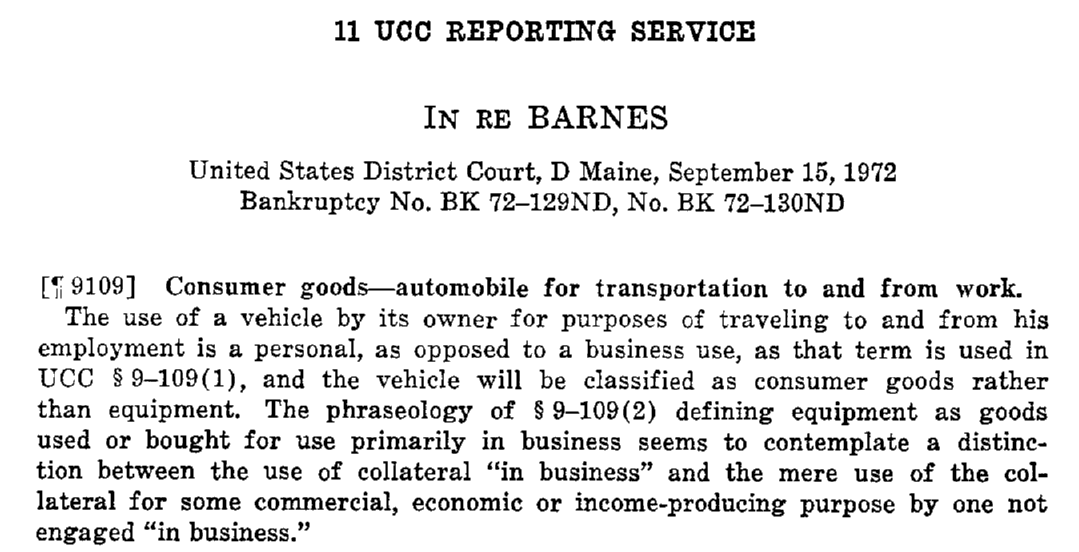

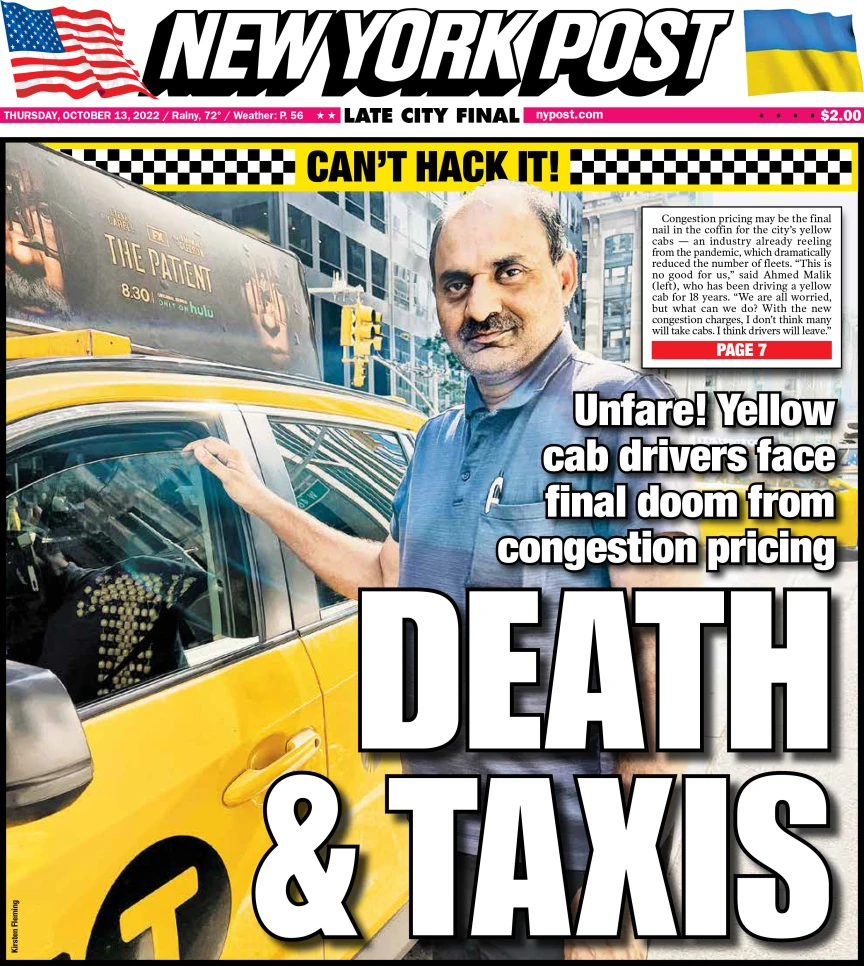
Congestion pricing killing NYC’s iconic yellow cabs: ‘This is the final nail in the coffin’
By Kirsten Fleming
October 12, 2022
Ahmed Malik has been driving a yellow cab for 18 years, and he’s never seen the industry so beaten down. And he fears if the new congestion pricing plan comes to pass, it will spell financial doom for him and his fellow hacks.
“This is no good for us,” he told The Post. “We are all worried but what can we do? With the new congestion charges, I don’t think many will take cabs. I think drivers will leave.”
The Brooklyn resident, who hails from Pakistan and works 10-hour days, seven days a week, said he is already barely scraping by while renting his car and paying for gas. He said taxi drivers are also hit with petty but exorbitant fines for infractions.
Under the MTA’s new congestion pricing plan, which aims to cut down on Manhattan traffic, decrease emissions and fill its coffers for upgrades, drivers could face $9 to $23 in fees to drive into parts of Manhattan as soon as late 2023.
Clearly,
the word “driver” is a job title. Clearly “driving” is a
job. Clearly “traffic” means commerce. Clearly
CONGESTION and TRAFFIC do not mean the same thing.
The infraction was codified into
law in California in 1969. It was modeled on the New York
infraction. An infraction in California has never been a
crime just like New York.
Infractions in New York are not
crimes, they never have been. There is no jail time for an
infraction. There is jail time for crime. You
do not get a jury trial for an infraction. You get a jury
trial for crime. You do not get an attorney paid for at
public expense for an infraction. You get an attorney paid for at
public expense for crime.
You can not be imprisoned for an infraction.
“...infractions are not crimes. ...the Legislature never intended infractions to be crimes.”
People v. Sava (1987) 190 Cal.App.3d 935
CALIFORNIA PENAL CODE
19.6. An infraction is not punishable by imprisonment.
834.
An arrest is taking a person into custody, in a case and in the manner
authorized by law. An arrest may be made by a peace officer or by a
private person.
835. An arrest is made by an actual restraint of the person, or by submission to the custody of an officer.
...traffic stops are technically "arrests"...
"Investigative Detentions", Spring 2010 POINT OF VIEW, ALAMEDA COUNTY DISTRICT ATTORNEY'S OFFICE. p. 1
A traffic arrest occurs when an officer stops a vehicle after seeing the driver commit an
infraction. ...the purpose of the stop is to enforce the law, not conduct an investigation.
"Arrests", Spring 2009, POINT OF VIEW, ALAMEDA COUNTY DISTRICT ATTORNEY'S OFFICE, p. 1
The Fourth Amendment applies to all seizures of the person
including those consuming no more than a minute. (United States v.
Brignoni-Ponce, supra, 422 U.S. at pp. 879-880 [45 L.Ed.2d at pp.
615-616].)
PEOPLE v. SPICER (1984) 157 Cal.App.3d 213
The Vehicle Code however, refers to the person awaiting citation as "the arrested person."
People v. Hubbard (1970) 9 Cal.App.3d 827
Vehicle Code section 40504, subdivision (a), commands that when a
traffic offender such as defendant herein gives his written promise to
appear by signing two copies of the citation, "Thereupon the arresting
officer shall forthwith release the person arrested from custody."
People v. McGaughran (1979) 25 Cal.3d 577
CALIFORNIA VEHICLE CODE
40504. (a)
The officer shall deliver one copy of the notice to appear to the
arrested person and the arrested person in order to secure release must
give his or her written promise to appear in court... Thereupon, the
arresting officer shall forthwith release the person arrested from
custody.
People
are being arrested without a warrant for allegedly committing a
noncriminal commercial or business rule violation. The
so-called “traffic” stop is a warrantless arrest for an alleged
noncommercial rule violation. The allegation by the
arresting officer is FAILURE TO COMPLY WITH A RULE APPLICABLE TO
COMMERCE. That’s true or false. TRAFFIC means
commerce. CONGESTION does not mean commerce.
Commercial rule violations are adjudicated in TRAFFIC
court. A judge or commissioner in TRAFFIC court determines
if a rule applicable to commerce has been violated and the whether the
arresting officer’s arrest was authorized.


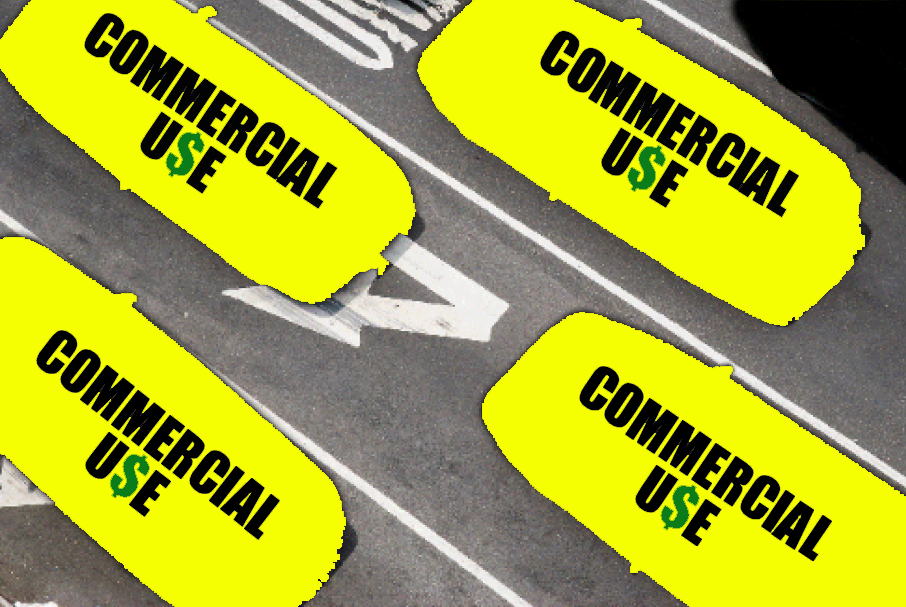
A PASSENGER is a CUSTOMER.
A PASSENGER/CUSTOMER pays to be transported to a destination by a
commercial vendor identified by the word “driver”. The
passenger/customer engages in a financial transaction with a
driver. The passenger/customer has a contract with the driver who
is a service provider or vendor of service. The service provided
is called transportation. The service is
commercial. The service involves compensation or payment
for the service. The contract for service is commercial in
nature. The “driver” is a VENDOR and the passenger/customer
is a VENDEE.

That woman is giving indication
of her intent to engage in a commercial contract with the vendor in the
yellow car, a cab “driver”, for transportation service.
She’s giving indication she’s a
prospective passenger or customer willing to contract and compensate or
pay for transportation service.
In fact every motor vehicle in
that photo is engaged in the commercial use of the street.
Everyone behind the wheel is being compensated or paid and identified
as “driver”. They are in the same class or category. The
woman isn’t. The woman is in a different class or category.
She’s indicating she’s willing to
engage in a commercial transaction but isn’t yet involved in commerce,
she’s merely indicating or giving notice of her intent. Hence,
the mere standing there with her arm extended is NONCOMMERCIAL
conduct.
Her conduct is noncommercial as
is someone who uses their car to go to their place of worship.
People don’t get paid nor pay to use their car to go to their place of
worship, hence their use is NONCOMMERCIAL and COMMERCIAL RULES do not
apply to them. If they’re stopped by a police officer for
an alleged violation of the Vehicle Code and issued a so-called
“traffic ticket”, the law enforcement officer alleged failure to comply
with a rule applicable to commerce or business. The
allegation is true or false.
The legal system in this country
imposes an obligation on the accuser to prove their allegation.
The party accused is considered innocent until the accuser proves, with
sufficient credible evidence, they’re not. The accused
doesn’t have to lift a finger or open their mouth in their defense, the
burden is on the accuser to prove their allegation of wrongdoing.
CALIFORNIA
EVIDENCE CODE
520. The party claiming that a person is guilty of crime or wrongdoing has the burden of proof on that issue.
HOW DO YOU USE YOUR DEVICE OR APPARATUS? DO YOU USE IT AS CONSUMER GOODS OR EQUIPMENT?
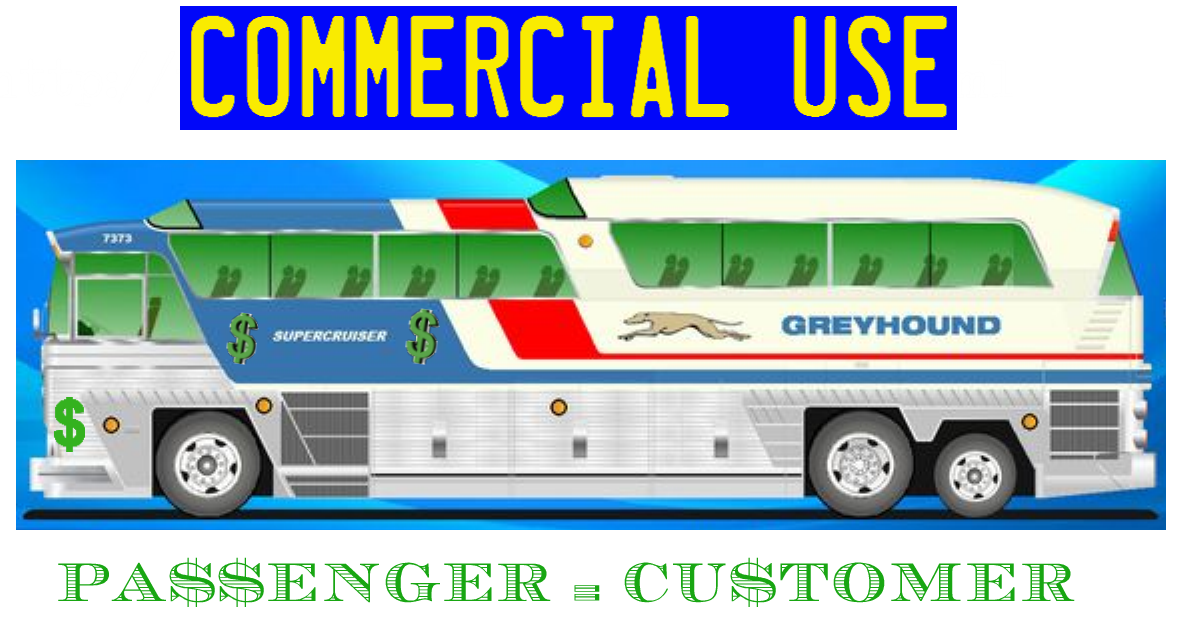
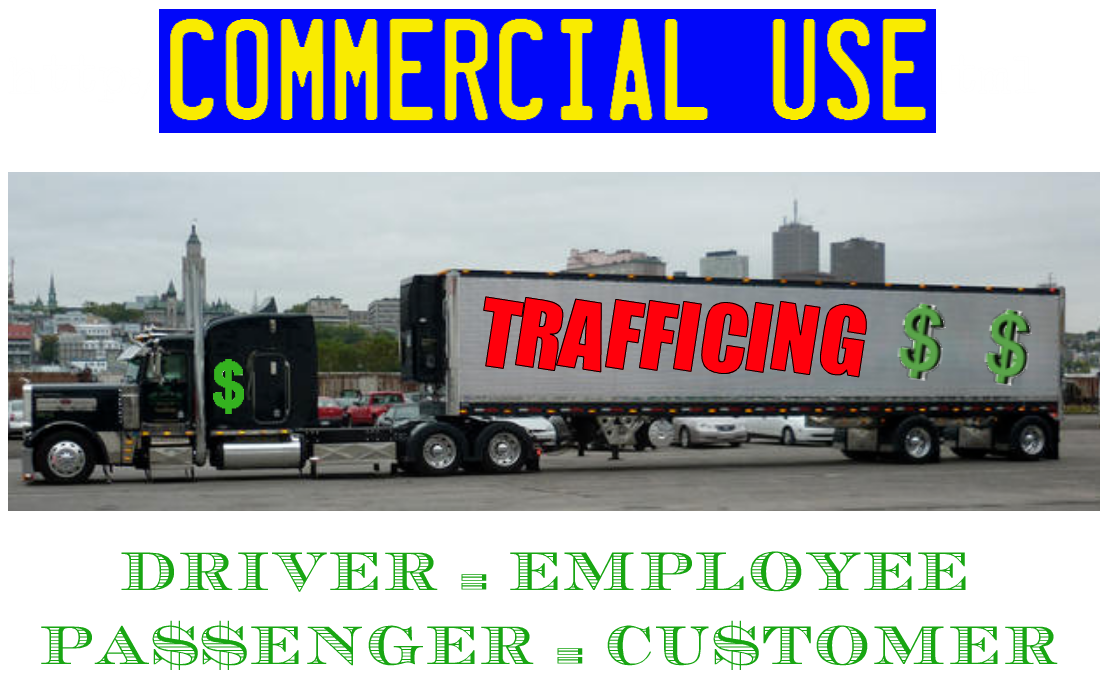


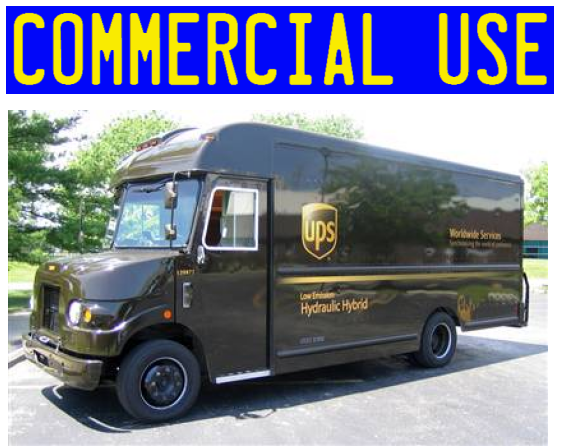

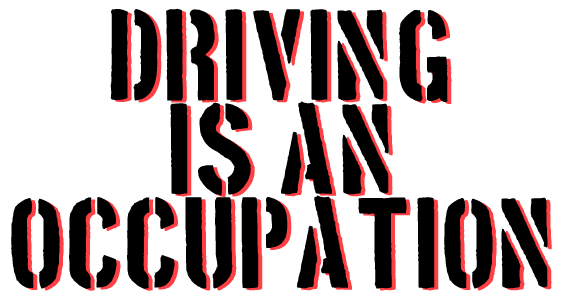

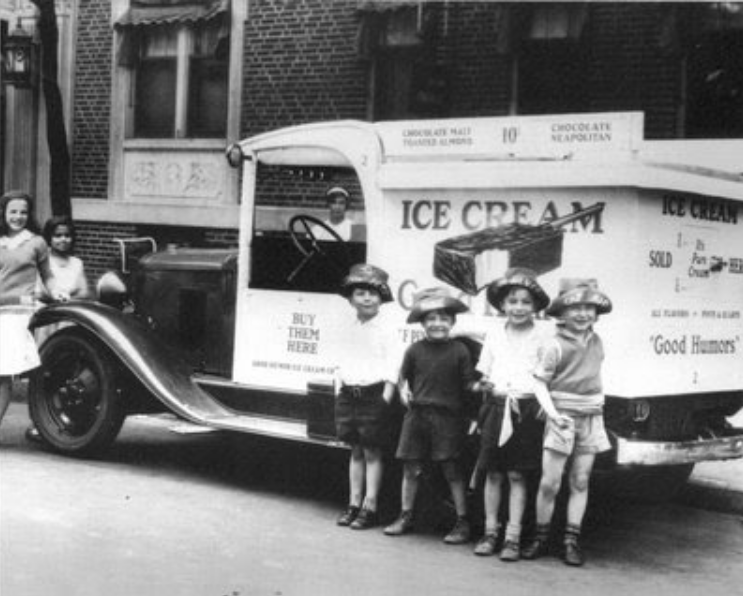

COMMERCIAL U$E
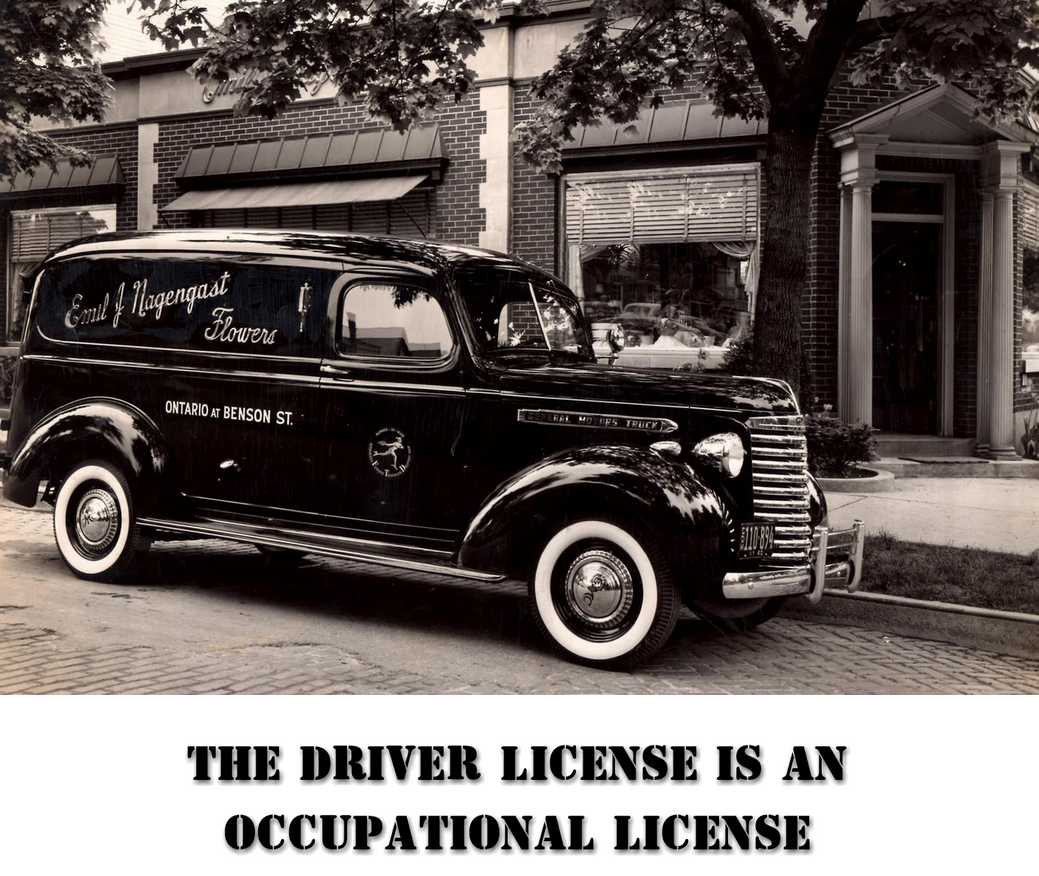

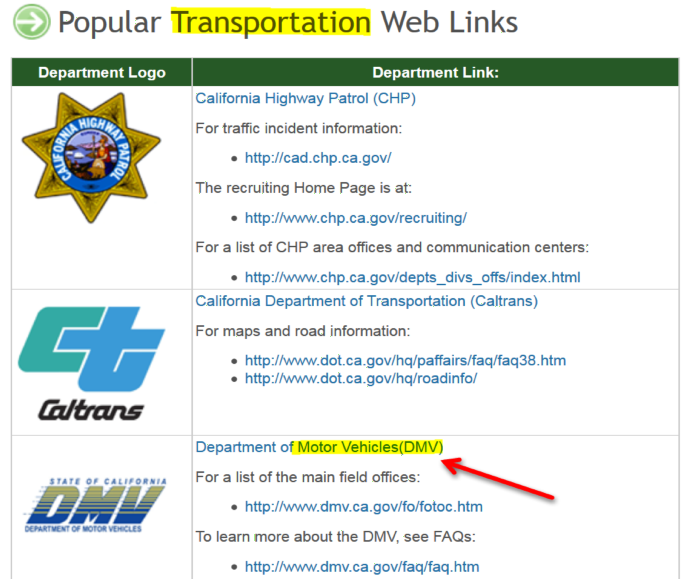

ISSUES PERMI$$ION CARD$ TO ENGAGE IN COMMERCIAL OR BU$INE$$ CONDUCT KNOWN A$ DRIVING


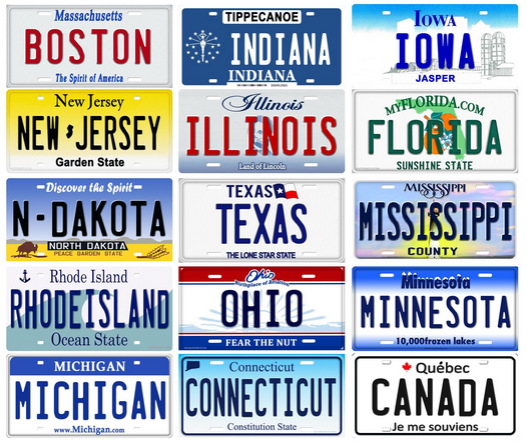 LICEN$E PLATE = EVIDENCE OF COMMERCE OR BU$INE$$
LICEN$E PLATE = EVIDENCE OF COMMERCE OR BU$INE$$
 NEED A
NEED A


THE RED ARROWS ARE POINTING AT THOSE WHO ARE DRIVING.
THE GREEN ARROWS ARE POINTING AT NONCOMMERCIAL USERS OF THEIR HIGHWAYS.
TRAFFIC DOES NOT MEAN CONGENSTION.
CONGESTION DOES NOT MEAN TRAFFIC.
"…the right of the citizen to drive on a public street with
freedom from police interference, unless he is engaged in suspicious
conduct associated in some manner with criminality, is a fundamental
constitutional right which must be protected by the courts."
People v. Horton (1971) 14 Cal.App.3d 930
It is settled that the streets of a city belong to the people of a
state and the use thereof is an inalienable right of every citizen of
the state.
Whyte v. City of Sacramento (1924) 65 Cal. App. 534
Escobedo v. State Dept. of Motor Vehicles (1950) 35 Cal.2d 870
[1] "The streets of a city belong to the people of the state, and every
citizen of the state has a right to the use thereof, subject to
legislative control .... "'The use of highways for purposes of travel
and transportation is not a mere privilege, but a common and
fundamental right, of which the public and individuals cannot
rightfully be deprived ... [A]ll persons have an equal right to use
them for purposes of travel by proper means, and with due regard for
the corresponding rights of others.'" (Escobedo v. State of California
(1950) 35 Cal.2d 870, 875-876 [222 P.2d 1], fn. 4 quoting 25 Am.Jur.,
Highways, § 163, p. 457; italics added.)
Rumford v. City of Berkeley (1982)31 Cal.3d 545, S.F. No. 24239, Supreme Court of California.
"'The streets of a city belong to the people of the state, and every
citizen of the state has a right to the use thereof, subject to
legislative control .... "The use of highways for purposes of travel
and transportation is not a mere privilege, but a common and
fundamental right, of which the public and individuals cannot
rightfully be deprived ... [A]ll persons have an equal right to use
them for purposes of travel by proper means, and with due regard for
the corresponding rights of others. [Citations.]"' [Italics added, fns.
omitted.]
City of Poway v. City of San Diego (1991) 229 Cal.App.3d 847

All
the forgoing references are from legal sources. They're
from court decisions, law dictionaries, law encyclopedias, and other
publications that are recognized and acknowledged within the law
realm.
It should be apparent none of that was taught
to us while we were forced to attend skool that our parents were forced
to pay for, yet a lot of someones knew about it because you just saw
it.
It should also be apparent that our decisions
regarding our cars, trucks, vans and motorcycles and the driver license
is based on HEARSAY and not the facts you've just seen.
If this was a game then someone won and
someone lost. And someone lost alotta money and subjected
themselves to alotta restrictions. Consider for a moment
what you don't "have to" register:
- Refrigerator
- TV
- Computer
- Phone
- Chain Saw
- Tools
- Kitchen Table
- Chairs
- Couch
- Patio Furniture
- Bicycle
- Bed
- Shoes
- Wrist Watch
- Wedding Ring
- Carpets
- Baseball Bat
All that stuff people would agree are really
important to how they live and their comfort and enjoyment.
And there's a few items people would call very dangerous on that
abriviated list of possessions. And consider for a moment
no one is required or mandated to have a license to purchase and
possess gasonile or diesel, which are both very dangerous
chemicals. In fact, no one is required to have a license to
purcahse chlorine, or swimming pool acid, turpintine, varnish, or paint
thinner which are all potentitlaly deadly chemicals as
well. But for some reason people "have to", are required
to, or mandated to register their car, truck, van or
motorcycle. Has anyone other than government employees who
make law wondered why? Why do you "have to" register your
car but not your refirgerator? In my opinion the refrigerator is
more important that a car.
There's a saying: IN THE LAND OF
THE BLIND, THE GUY WITH ONE GOOD EYE IS KING. There's another
saying: KNOWLEDGE IS POWER. Well I considered that
incomplete and inacurate, Knowledge and power are NOT the same
thing so I added to it: KNOWLEDGE IS POWER WHEN PROPERLY
APPLIED. Knowledge still isn't power but that kinda is closer to
the spirit of the original saying, in my opinion.
And another opinion is we've been
deceived. We've been lied to. We've been ripped
off. We've been damaged. We've been made to suffer
because none of all that stuff was taught to us so our lives have been
not exactly full. No one in their right mind would register
their car and pay to do so or ask for permission to do something they
don't intend to do. If people owned a horse ranch they would not
ask their stable boy for permission to ride one of their horses on
their land. But that's precisely what's happening re cars,
trucks, vans, and motorcyles, and represented by the Driver
License.
We're supposedly FREE and have
INALIENABLE RIGHTS. Really?! Then why do
you register your ride and ask for permission to use it?
What's so FREE about that? I studied for 4 YEARS before I took
corrective measures to FREE myself from the DMV and no longer register
MY CONSUMER GOODS which I use for NONCOMMERCIAL TRAVEL and other
HOUSEHOLD purposes and my enjoyment which is an INALIENABLE
RIGHT. AND HELL NO, I don't have a Driver License and haven't going on 20+ YEARS.
HOW I USE my
ride is perfectly legal. I merely travel for noncomercial
purposes and I don't get paid nor earn nor am compensated for doing so.
No one who rides with me is a CUSTOMER, or what the majority
call a PASSENGER. They don't pay me to ride along.
My decisions are based on THE LAW AS
WRITTEN, RECOGNIZED and ACKNOWLEDGED by judges and other legal
professionals. I used CONTRACT LAW to undo the damage I did to
myself due to the COMPULSORY IGNORANCE to which I was subjected for 12
YEARS that my parents were forced to pay for. NO, I was NOT
educated, I was PROGRAMMED and I've invested 30 YEARS to UNPROGRAMMING
myself and learning the truth. I've read over 75,000 court
decisions and have way more than that which I've collected over 3
DECADES.
I
DO NOT WANT TO BE AN ATTORNEY! I SIMPLY WANT TO KNOW WHAT
ATTORNEYS KNOW! I HAVE FINGERS, MY BRAIN WORKS AND I CAN
SPEAK SO I CAN SAY AND TYPE THE SAME THINGS ATTORNEYS SAY AND
TYPE. I JUST NEEDED TO FIND WHAT THEY WERE MADE AWARE OF!
IT'S ALL AT THE LAW LIBRARY!
CONSTITUTION OF THE STATE OF CALIFORNIA
Article I: Declaration of Rights
Sec. 1.
All
men are by nature free and independent, and have certain unalienable
rights, among which are those of enjoying and defending life and
liberty: acquiring, possessing and protecting property: and pursuing
and obtaining safety and happiness, and privacy.
Sec. 10.
The people shall have the right freely to assemble together, to consult for the common good,...
Sec. 21.
This enumeration of rights shall not be construed to impair or deny others, retained by the people.

The people of the State of
California are supreme and have the undoubted right to protect
themselves and to preserve the form of government...
Steiner v. Darby (1948) 88 Cal.App.2d 481
CALIFORNIA GOVERNMENT CODE
4. No action or proceeding commenced before this code takes effect, and no right accrued, is affected by this code,...
CALIFORNIA VEHICLE CODE
Pending Proceeding and Accrued Rights
4.
No action or proceeding commenced before this code takes effect, and no
right accrued, is affected by the provisions of this code,...
CALIFORNIA CIVIL CODE
6. No action or proceeding commenced before this Code takes effect, and no right accrued, is affected by its provisions.
CALIFORNIA GOVERNMENT CODE
100.(a) The sovereignty of the state resides in the people thereof,...
11120.
It is the public policy of this state that public agencies exist to aid
in the conduct of the people's business and the proceedings of public
agencies be conducted openly so that the public may remain informed.
In enacting this article the Legislature finds and
declares that it is the intent of the law that actions of state
agencies be taken openly and that their deliberation e conducted
openly.
The people of this state do not yield their
sovereignty to the agencies which serve them. The people, in delegating
authority, do not give their public servants the right to decide what
is good for the people to know and what is not good for them to know.
The people insist on remaining informed so that they may retain control
over the instruments they have created.
54950 DECLARATION OF LEGISLATIVE PURPOSE .
"In enacting this chapter, the Legislature finds and declares that the
public commissions, boards and councils and the other public agencies
in this State exist to aid in the conduct of the people's
business. It is the intent of the law that their
actions be taken openly and that their deliberations be conducted
openly.
The people of this State do not yield their
sovereignty to the agencies which serve them. The people,
in delegating authority, do not give their public servants the right to
decide what is good for the people to know and what is not good for
them to know. The people insist on remaining informed so
that they may retain control over the instruments they have created".
Matthew 17: 24 - And when
they were come to Capernaum, they that received tribute money came to
Peter, and said, Doth not your master pay tribute?
Matthew 17: 25 - He saith, Yes.
And when he was come into the house, Jesus prevented him, saying, What
thinkest thou, Simon, of whom do the kings of the earth take custom or
tribute? of their own children, or of strangers?
Matthew 17: 26 - Peter saith unto him, of strangers, Jesus saith unto him, Then are the children free.
You're either a
FOREGINER or one of the CHILDREN. I know what I am.

 I HAVE AND IT'S WORKED FOR ME. MAYBE IT WILL WORK FOR YOU AND THE PEOPLE YOU CARE ABOUT TOO!
I HAVE AND IT'S WORKED FOR ME. MAYBE IT WILL WORK FOR YOU AND THE PEOPLE YOU CARE ABOUT TOO!

BLACK'S LAW DICTIONARY 1st Ed. BLACK'S LAW DICTIONARY 4th Ed. BOUVIER'S LAW DICTIONARY 1856






